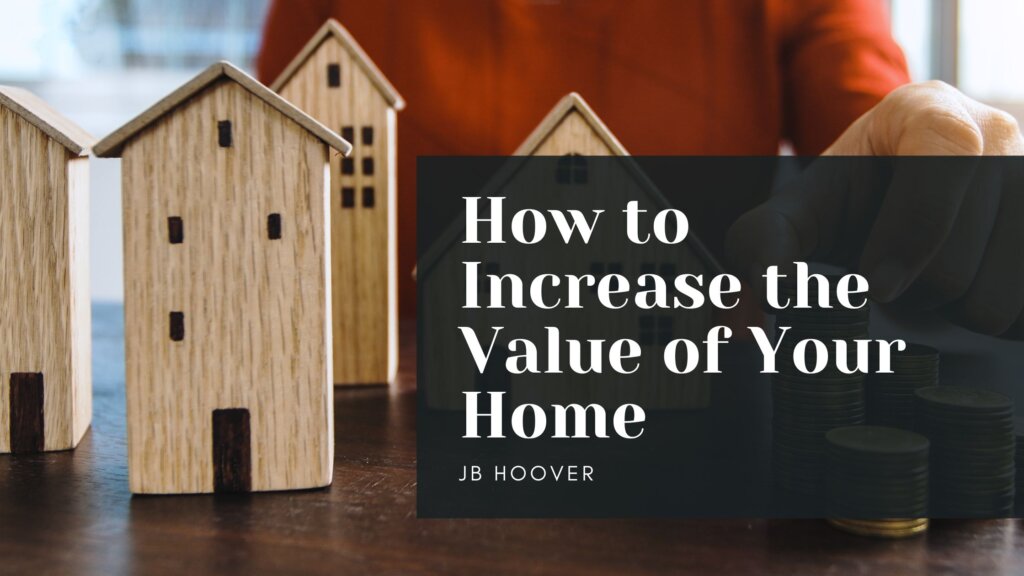How to Increase the Value of Your Home

Whether you’re planning to sell your home shortly or simply want to enhance its overall value and appeal, there are several strategies you can employ to increase your home’s value. From minor updates to more significant renovations, investing in your property wisely can yield substantial returns.
Enhance curb appeal
First impressions matter, and the exterior of your home sets the tone for potential buyers or appraisers. Boost your home’s curb appeal by maintaining a well-manicured lawn, trimming hedges, planting flowers, and applying fresh paint to the front door and exterior walls. Consider adding outdoor lighting and upgrading your mailbox and house numbers for a polished look.
Update the kitchen
The kitchen is often considered the heart of a home, and it can significantly impact its value. Focus on minor upgrades like replacing outdated hardware, updating light fixtures, or installing a backsplash. If your budget allows, consider replacing old appliances with energy-efficient models and upgrading countertops and cabinetry.
Revamp the bathroom
Bathrooms are another area of the home that buyers pay close attention to. Simple changes such as replacing faucets, upgrading lighting fixtures, and re-grouting tiles can freshen up the space. Consider adding storage solutions and updating the vanity for added functionality and visual appeal.
Improve energy efficiency
Energy-efficient features not only reduce utility bills but also increase the value of your home. Replace traditional incandescent light bulbs with LED ones, install a programmable thermostat, add insulation to the attic, and consider upgrading windows to energy-efficient models. These upgrades demonstrate your commitment to sustainability and can attract potential buyers.
Create additional living space
If feasible, consider adding square footage to your home to increase its value. This could involve converting an underutilized attic or basement into a functional living space, building an extension, or even adding a deck or patio. More living space adds versatility and appeals to a broader range of buyers.
Update flooring and paint
Fresh paint and updated flooring can work wonders in transforming the look and feel of your home. Choose neutral colors that appeal to a broad audience and opt for durable, low-maintenance flooring options such as hardwood or laminate. These updates can significantly enhance your home’s value.
Maintain regular home maintenance
Regular home maintenance is crucial in preserving your property’s value. Stay on top of repairs, fix leaks, update outdated systems, and ensure the overall functionality of your home. A well-maintained home signals potential buyers that the property has been cared for and reduces the likelihood of significant issues.
Tips for First-Time Home Buyers

Buying a home is an exciting milestone, but it can also be a complex and overwhelming process, especially for first-time home buyers. From finding the right property to navigating mortgage options and closing the deal, several factors must be considered.
Determine your budget and get pre-approved
Before you start house hunting, it’s crucial to establish a realistic budget. Evaluate your financial situation, including your income, savings, and debts. Use online mortgage calculators to estimate affordability and monthly payments. Getting pre-approved for a mortgage will give you a clear idea of how much you can borrow and help streamline the buying process.
Research and hire a trusted real estate agent
Working with an experienced real estate agent can significantly impact your home-buying journey. Research and interview multiple agents to find someone who understands your needs, has in-depth market knowledge and can guide you through the process. A skilled agent can help you find suitable properties, negotiate offers, and navigate paperwork.
Prioritize your needs and wants
Make a list of your must-haves and nice-to-haves in a home. Consider location, size, layout, amenities, and proximity to schools or transportation. Clear priorities will help you focus your search and make decisions more efficiently.
Get a professional home inspection
Never skip a home inspection, even if the property appears in good condition. A professional inspector will identify potential issues or hidden problems that may affect the property’s value or require costly repairs. The inspection report will give you leverage for negotiation or help you decide whether to proceed with the purchase.
Understand mortgage options and terms
Research different types of mortgages and understand their terms and conditions. Compare interest rates, down payment requirements, and loan terms offered by various lenders. Consider consulting with a mortgage broker to explore multiple options and choose the best fit for your financial goals.
Plan for additional costs
In addition to the purchase price, budget for additional expenses such as closing costs, property taxes, homeowner’s insurance, and potential maintenance or renovation costs. Being prepared for these expenses will prevent any financial surprises after you’ve purchased the home.
Don’t rush into a decision
Take your time to evaluate properties and make informed decisions thoroughly. Don’t feel pressured to buy a home if it doesn’t meet your requirements or if you’re uncertain about the investment. Remember, buying a home is a long-term commitment, so it’s essential to choose wisely.
Things that Affect the Real Estate Market

The real estate market is dynamic and influenced by various factors impacting property values, demand, and overall market conditions. Whether you’re a homeowner, investor, or aspiring real estate professional, understanding the key factors that affect the real estate market is crucial.
Economic Factors
The economy plays a significant role in shaping the real estate market. Factors such as GDP growth, employment rates, inflation, and interest rates can impact the demand and affordability of properties. During periods of economic expansion, people tend to have more disposable income, which can lead to increased demand for homes and commercial spaces. Conversely, the market may decrease during economic downturns as people face financial constraints.
Supply and Demand
The basic principles of supply and demand significantly affect the real estate market. When the supply of properties is limited relative to the demand, it creates a seller’s market with higher prices and increased buyer competition. Conversely, an oversupply of properties can lead to a buyer’s market, where prices may decrease, and buyers have more negotiating power. Population growth, construction rates, and market conditions influence the balance between supply and demand.
Interest Rates and Mortgage Availability
Interest rates have a significant impact on the affordability of real estate. When interest rates are low, borrowing costs decrease, making it more attractive for buyers to invest in properties. Low rates can stimulate demand and increase home prices. Conversely, higher interest rates can reduce affordability and dampen demand. Mortgage availability and lending standards also play a role in the real estate market, as tighter lending conditions limit buyers’ ability to secure financing.
Government Policies and Regulations
Government policies and regulations can shape the real estate market at both the local and national levels. Changes in tax policies, zoning regulations, building codes, and lending regulations can directly impact property values, development projects, and market activity. For example, government incentives for first-time homebuyers or tax benefits for real estate investors can influence demand and market conditions.
Demographic Factors
Demographic trends – including population growth, migration patterns, and changing household compositions – can impact the real estate market. The preferences and needs of different demographic groups, such as millennials, baby boomers, or immigrant populations, can shape demand for specific property types and locations. Understanding demographic shifts can help identify emerging real estate trends and investment opportunities.
These factors can impact property values, market conditions, and investment opportunities. By staying informed about the critical drivers of the real estate market, individuals can make more informed decisions related to buying, selling, or investing in real estate. It’s important to note that local market conditions may vary, and consulting with real estate professionals or experts can provide further insights tailored to specific regions or property types.
About JB Hoover, Newport Beach
Based in Newport Beach, JB Hoover is the Founder and Principal of National Quality Construction in Tustin, Orange County, California. Prior to starting his own business, JB spent over ten years as Vice President of Construction at a Custom Boutique Homebuilder. JB mainly focuses on real estate rehabilitation, which consists of flipping foreclosed homes into dream houses for young couples or people buying their first home. Other than his passion for his professional endeavors, JB is also passionate about golf, travel, and cars.
As a student at Whittier College in Los Angeles, JB Hoover enjoyed cars so much that he used to flip and customize them to earn extra money. However, he found few cars that he loved too much to sell and decided to keep them instead. Today, JB’s car collection includes seven rare vehicles — some of which include a few Mercedes-AMG cars, which are modeled after racing cars and are known to be characterized by the company’s courage and passion in the car-making industry.
In fact, JB’s passion for cars is what inspired him to get into the construction and development business. He noticed one of his frequent buyers had a large collection of exotic vehicles, and questioned the buyer about their career. The buyer said he was a successful construction developer in the area, and built residential real estate for families and young couples. JB became fascinated by the business, and decided to pursue the same career path by earning a bachelor’s degree in business administration with a minor in real estate. He then combined his two passions of flipping cars and construction into a business that creates affordable homes for everyday buyers.
When JB Hoover of Newport Beach is not on the job, he enjoys traveling internationally. With four continents and dozens of countries visited under his belt, JB has truly experienced the different cultures, cuisines and different climates that he’s exposed to on his travels. He particularly enjoys Western Europe in countries like Germany, Italy and Switzerland.
In addition, JB Hoover enjoys golfing on several of the beautiful golf courses that overlook the Orange County skyline. As a player of over 20 years, JB is no longer the talented golfer he used to be, but that doesn’t stop him from enjoying time outside in the California sunshine and attempting to become a scratch golfer again. Inspired by watching golf on TV and observing his grandfather and great-grandfather play the sport, JB Hoover played golf in high school and college and hopes that he, too, can play the game well into his 90s as his grandfather and great-grandfather did.

